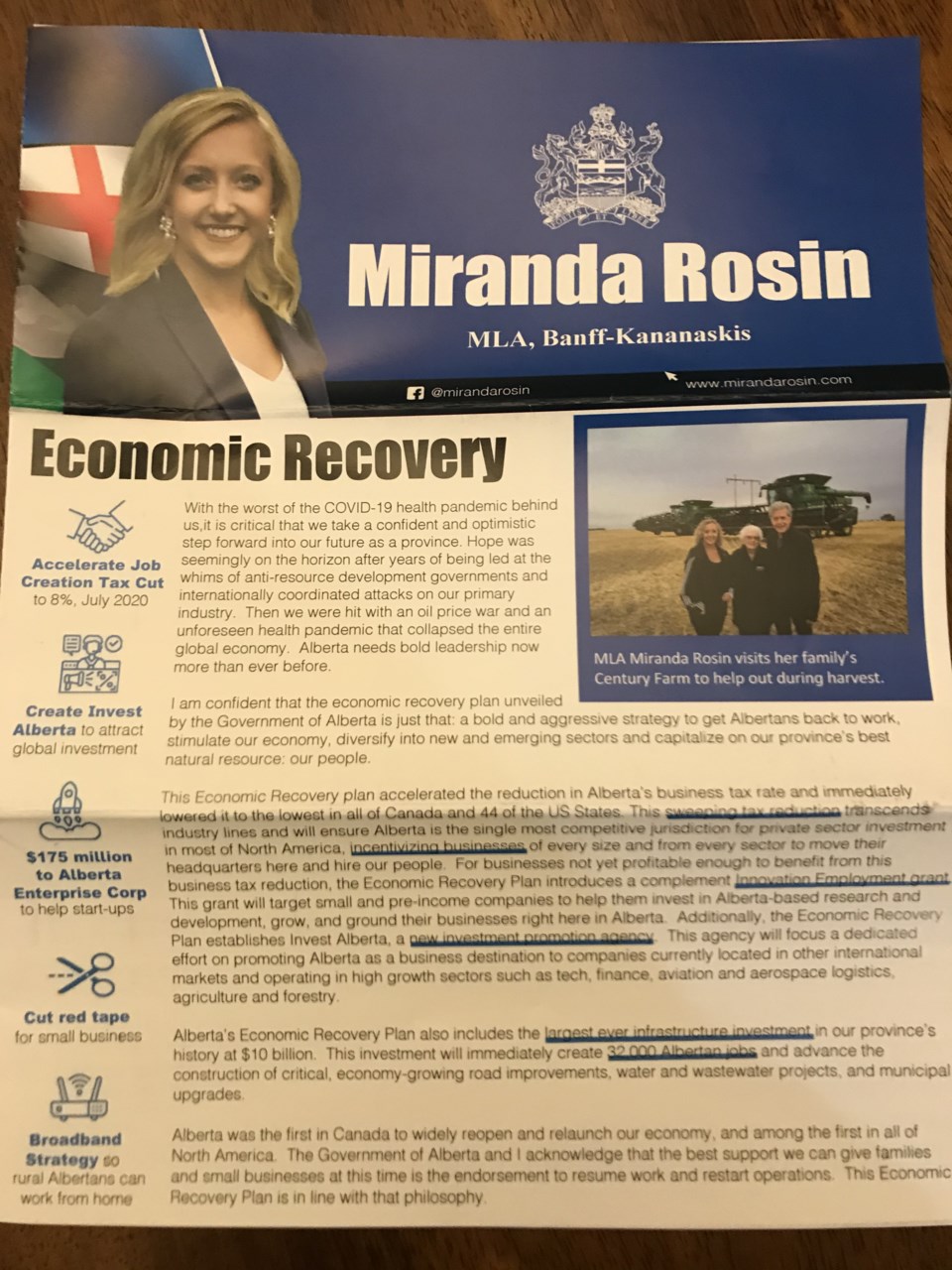BOW VALLEY – Banff-Kananaskis MLA Miranda Rosin has tried to address her false claim in a controversial newsletter that the “worst” of the pandemic is over, as COVID-19 numbers in the Bow Valley continue to rapidly rise.
As of Saturday afternoon (Nov. 21), the number of active COVID-19 cases in Banff and Lake Louise climbed from 92 to 108. Canmore’s active case count grew to 36 and Alberta Health reported five active cases in the MD of Bighorn.
Rosin’s controversial newsletter, titled Economic Recovery, landed in local mailboxes this week, leading to widespread calls for an apology and leading to media headlines across the country.
“With the worst of the COVID-19 health pandemic behind us, it is critical that we take a confident and optimistic step forward into our future as a province,” she wrote.
In the face on ongoing criticism, Rosin turned to Facebook on Saturday to respond.
While she didn’t offer an apology, she said her newsletter was sent to print in early fall when Alberta’s active cases were below 2,000, but was only delivered to mailboxes this week.
“There is no denying that Alberta's case count is now sharply rising, especially in communities such as Banff,” she said.
“Of course, everyone must rigorously follow public health guidelines at this critical moment.”
Former NDP MLA for the Bow Valley, Cameron Westhead, who is also currently second vice-president of the United Nurses of Alberta union, had called on Rosin to apologize.
He said that the curve was already on the rise when Alberta had 2,000 active cases.
“Every public health expert said we were in for a second wave,” he said.
“The fact that Rosin either wasn't aware of this, or chose to ignore it, is inexcusable.”
The UCP government continues to oppose all calls, including from physicians and health-care unions, for a temporary circuit-breaker shutdown to try to flatten the on COVID curve. As of Saturday, there were 11,274 active cases province-wide.
Of those 320 were in hospital, including 56 in intensive care.
“Our current situation is grim,” said Deena Hinshaw, Alberta’s chief medical officer of health, in her latest update on Friday (Nov. 20).
On Sunday (Nov. 22), the Town of Banff’s emergency coordination centre (ECC) shut down all team sports, cohorted program and high-intensity fitness programs in municipal facilities, including the Fenlands recreation centre.
The drop-in family play program at 101 Bear St. will also be temporarily suspended.
“We are adopting for municipal programs the restrictions that the chief medical officer announced for the Calgary-Edmonton and surrounding areas,” according to the announcement.
“Our goal is to limit the number of close contacts that people are having with one another in the community.”
The Town of Banff will move some programming back online.
“We know that recreation and social connection is an important part of people’s lives, and beneficial for mental and physical health,” according to the ECC announcement
Hinshaw said about one in four people who need hospital care for COVID-19 and one out of every six in ICU with COVID-19 have no pre-existing medical conditions.
But she said it is also important to remember that having a chronic medical condition, such as high blood pressure or diabetes, is very common.
“In Alberta, almost one quarter of all adults over the age of 20 have a chronic condition,” she said.
“That is almost 800,000 people. Ten per cent have two conditions, and eight per cent have three or more.”
Older adults are more likely to have medical conditions.
Hinshaw said that of those over the age of 50, for example, 65 per cent have one or more chronic conditions.
“When looking just at men in Alberta, more than half of men over 50, and almost 70 per cent of men over 65, have high blood pressure. That should not be a death sentence,” she said.
“Most Albertans will have a family member or friend with these conditions. We must remember that our actions protect these people as well as ourselves.”
Hinshaw said Alberta Health Services is able to add more intensive care capacity – but creating this capacity means stopping or delaying other services.
“This is the impact we want to avoid,” she said. “Demand for COVID-19 is still high and the system is taxed.”
To help reduce demand on ICUs, and on hospitals, Hinshaw encourages all Albertans to follow all public health measures in place.
“The best way to ensure capacity is available and to drive hospitalizations down is to reduce community transmission – which in turn will reduce the need for additional COVID-19 beds,” she said.
In Lake Louise, Parks Canada has announced the visitor centre has been closed there to in-person visits until further notice due to the growing case numbers in the area.
Visitor services will be available by email at [email protected] or by phone at 403-522-3833.
“Services are limited in the village of Lake Louise as businesses are continuing to adjust opening hours,” according to a Parks Canada Facebook post. “Please check with businesses before visiting.”
In Banff, more businesses are temporarily closing their doors due to COVID cases, or as a precaution, given the escalating number of cases.
Banff National Park and Canmore are on the list of communities on enhanced status.
Restrictions in place from Nov. 13-27 include a mandatory 15-person limit on social and family indoor and outdoor gatherings.
All restaurants, bars, lounges and pubs will be required to stop serving alcohol at 10 p.m. and close by 11 p.m.; and wedding and funeral ceremonies are limited to 50 seated, with receptions where people mingle limited to 15 or fewer people. In addition, all faith-based organizations are asked to limit attendance to one-third capacity at any service.




